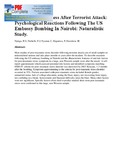| dc.description.abstract | Most studies of post-traumatic stress disorder following terrorist attacks are of small samples in industrialised nations and take place months or years after the incident.
To describe reactions following the US embassy bombing in Nairobi and the characteristic features of and risk factors for post-traumatic stress symptoms in a large, non-Western sample soon after the attack.
A self-report questionnaire which assessed potential risk factors and identified symptoms matching DSM-IV criteria for post-traumatic stress disorder was answered by 2883 Kenyans, 1-3 months after the bombing.
Symptoms approximating to the criteria for post-traumatic stress disorder occurred in 35%. Factors associated with post-traumatic stress included female gender, unmarried status, lack of college education, seeing the blast, injury, not recovering from injury, not confiding in a friend, bereavement and financial difficulty since the blast. Many other factors were not significant.
Specific factors often cited to predict marked short-term post-traumatic stress were confirmed in this large, non-Western sample. | en |

